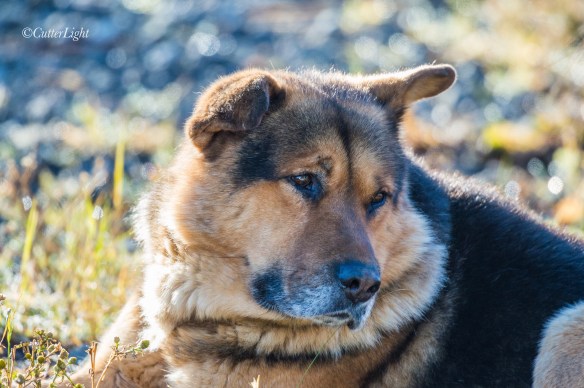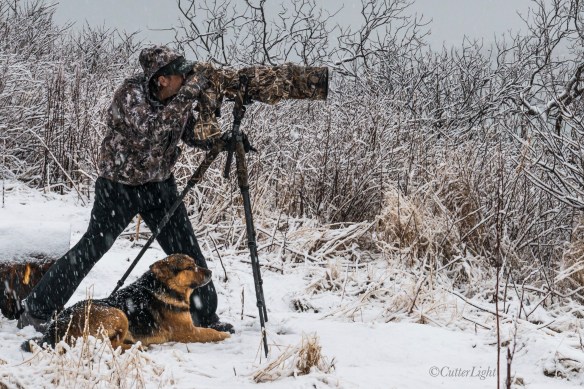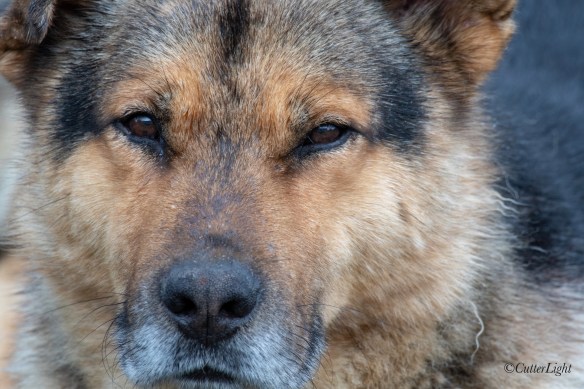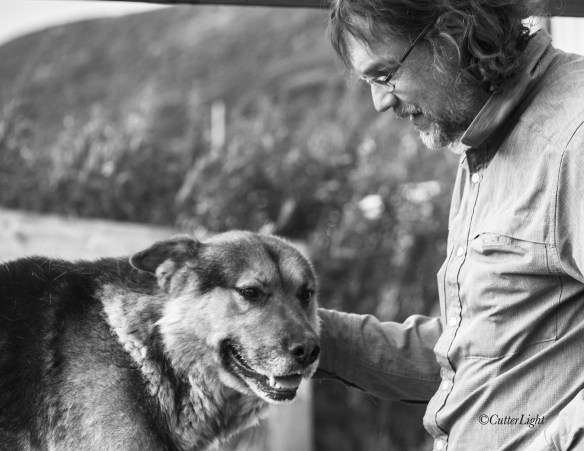
If there was ever a more naturally contented being, we’ve not met. But there was often a lot going on inside that big, lovable head.
He wasn’t our dog.
Shortly after we moved to The Lake, he began showing up, handsome with his barrel chest, slim hips and soft brown coat. Instantly lovable with those floppy, puppyish ears, sparkling brown eyes and that big head he liked to push into a hand to be petted. We didn’t know his name. So we called him Friendly. He seemed to always have a smile in his eyes, his bushy tail swishing back and forth hopefully whenever he saw us. We’d seen it before, a semi-feral village dog making the rounds, looking for a scrap of meat here, a bone there, maybe a dog biscuit or a bowl of last night’s leftovers.
But there was something different about this dog. In fact, there was a lot different about him. For starters, he traveled alone, doing his best to assume a live and let live attitude toward other dogs. He didn’t slink or skulk, bark or yip without good reason, beg or cower. He presented himself as a perfectly happy, intelligent, calm, confident being, and yet no one really seemed to own him. The backstory, we found out later, is that he had spent part of his early life as a truly feral “dump” dog, getting by on whatever he could scrounge. We were told that someone had eventually adopted him, but although he had places where he could often count on getting a meal, no one seemed to consistently take care of him.
It turned out that his name was Buster. When we began addressing him as such, it was apparent that he knew his name.
“We’re not going to start feeding him,” we reminded ourselves.
After all, he wasn’t our dog.

Hurts to look at. With the closest vet two bush flights and hundreds of miles away, removing these quills was difficult for the people involved and excruciatingly painful for Buster. This was his second such “lesson.” What is it with dogs and porcupines?
Even without the incentive of food, Buster began hanging out with us. On my daily birding walks, I could usually count on him to show up, seemingly out of nowhere, and falling into step. It seemed that he recognized the cadence of my stride and, as sometimes happens between two beings, that he’d taken a liking to me. When I arrived at wherever I was going to set up my tripod and camera for the morning – looking for ducks out on the river or lake, or songbirds at the White Spruce Grove – he’d position himself as closely to me as he reasonably could and then quietly, patiently and faithful watch alongside. Buster loved to be petted, and he had an endearing habit of pushing his head into my leg to remind me how much he loved being petted. For my part I couldn’t have asked for a better fellow birder. He had the capacity to remain still for a very long time and his alertness probably helped keep me more watchful. And so we spent mornings like that, enjoying sunshine, enduring rain and snow, staying low against the wind, documenting birds that in some instances had never before been recorded on this remote peninsula.
As I packed up and slung my tripod over my shoulder at the end of those birding sessions, Buster would spring to his feet, jog ahead of me a few paces, look back and give his head a little jerk in the direction we were heading, back to my house. It was as if he was saying, “C’mon, Jack! Let’s go get something to eat!”

There are bird dogs and there are bird dogs. Buster had the kind of toughness about him common to village dogs. Weather? What weather?
That’s how it started. A friend comes along and keeps you company for hours on end like that, both of us heading home hungry… You can’t not fix your buddy something to eat.
At first I’d dig around in the fridge for whatever leftovers might be on hand – a piece of salmon, gristly scraps of moose, or bones I’d left a little extra meat on for him. But before long dog biscuits and a quality dog food became part of our regular grocery orders. And of course a good friend like Buster needed a proper bowl. And a brush.
Between the good food and the regular brushings, which he loved, our already handsome friend was soon sporting a beautiful coat. His visits to our house became more regular and lasted longer until at some point we realized he was showing up almost without fail for breakfast each morning. In fact, quite often he was spending the entire night sleeping below our bedroom window.
We, who had vowed “No dogs, no pets,” were being adopted.

Buster, the quintessential outdoors dog, never did get used to coming into our home. Although he was always welcome, he usually would only stay for awhile, and only as long as he could sit or lie next to one of us. Indoors seemed to be too warm for him. So he was content to lie outside our windows, all the better if his vantage point provided him with a view of one of us working at a desk or cooking in the kitchen. As far as I could tell, he’d never been trained, not even to sit. But he was one of the most well-mannered dogs we’ve ever known. Every so often he might give out a single, throaty bark – Buster’s way of mentioning that he might be ready for a snack.
And so it went for two years. The three of us hiked together up to Clarks River and along other trails for miles in all weather. He accompanied me out onto the ice that first year when the lake froze hard and ducks gathered in a small area of remaining open water. There were no trappers in the village that year, and so along with lots of birds, many of which were new to us, a number of foxes regularly showed up in the village and a family of river otters patrolled the lake and river. Every other dog in the village went dog-bonkers anytime one of these wild mammals was present.

That first winter when the lake froze, the wildlife viewing was enthralling. I spent hours on the frozen lake almost every day while it lasted. But on this morning out on the ice, I was collecting landscape pictures. Buster had his eye on a group of ducks milling around in open water.
Not Buster. In the spirit of full disclosure, the first time we encountered otters together, he did run off toward them… And promptly found himself sliding off a ledge of thick ice along the bone-chilling Chignik River, his eyes wide with panic as he looked to me for help and tried to scramble out. I guided him downriver to a break in the ice, asked him if he’d learned anything about ice while he shook himself off, and then we went home where I dried him with a warm towel and we both got something to eat. We saw otters after that, but he never again chased after them – at least not in my presence.
And the foxes? He was curled up in the snow outside our window one evening when a certain fox came by. Buster barely looked up. Instead, the fox started barking at him!
Bears and wolves were a different story though, and we came to appreciate Buster’s selective vigilance. When he let loose with his deep-throated bark, you could bet one of these two predators was around – and that Buster was doing his duty to keep them moving along.

Toward the end, when the mere act of standing was painful, a wolf – probably a pack scout – had been showing up in the village fairly regularly. An enduring memory is of Buster one evening pulling himself to his feet, propping himself against our house, and letting loose a barrage of fierce barking. The courageous old General, still on duty.
It was those slim hips that ultimately were his demise. When we returned to The Lake late this last summer, it was clear he was beginning to have mobility difficulties. He still had that optimistic smile in his eyes and an expression of sheer joy upon seeing us, and he was still getting around pretty well, but he was beginning to walk sideways. We knew our friend might not see another spring.
Through fall, Buster continued to be a constant companion. But as winter settled in, I had to begin discouraging him from trying to accompany me out into the field. It hurt us both, made worse by the fact that I’m sure Buster didn’t understand why his pal wouldn’t let him come along anymore.
He was losing control of his hind legs. He began falling down. Eventually he stopped trying to follow.

I am indebted to Barbra for taking pictures of me and my friend. A Tufted Duck – an uncommon to rare visitor from Asia to parts of Alaska – had mixed itself in with a few scaup, and I was spending a lot of time at The Bend on the Chignik River attempting to get photos. That’s where Barbra found us when she finished teaching on this snowy January day one year.
But he still came by our house nearly every day. One especially nasty winter night Buster showed up at our front door quite ill. His nose was dry and hot to the touch, his eyes watery and listless. Fearing the worst, we had him come inside. I rolled out a sleeping bag on the kitchen floor so I could stay with him while he slept on the cool linoleum. The next morning he was greatly improved… for the time being.
Buster’s final days were difficult. In his last weeks, a small dog became his constant companion, watching over Buster as he hobbled around. Little Rex would chase magpies and other dogs away from Buster’s food dish, reach out with his paw to touch Buster and then curl up and sleep next to the old man. For Buster’s part, he showed enormous courage. He was in pain, and I have to imagine beyond frustration with his inability to get around as he once had. But there was still the brightness and optimism in his eyes that had drawn us to him the first time we met.
All the time we had known Buster, there was nothing he enjoyed more than a big bowl of food or a couple of biscuits. He was, after all, a dog, though perhaps much like many of us, food presented by a friend or loved one carries with it the additional pleasure of conveying a sense of being appreciated, loved and cared for. But toward the end, he wouldn’t begin eating until we petted him and talked to him for awhile.
He wasn’t our dog.
We had to keep reminding ourselves of that, and that decisions about how his last days should be handled had to be left to his owners. What we could do was help Buster be as comfortable and as loved as possible any time he came to our house, which he was still somehow managing to do almost every day.
What a wonderful friend. I don’t think we’ve ever known a being with a greater heart or a more optimistic outlook toward life.
He wasn’t our dog. He was our friend. And he is missed.


So sorry for your loss, it sounds like he was such a wonderful dog. ❤
Thank you, Kelsey.
Man, I knew I was going to be in tears by the time I got to the end…and here I am…
My Buster was Sammy, a shelter kitty that taught me so much.
You just don’t know how attached you can become until you know.. Thanks for reading and leaving a comment.
Oh man…. this was tough and beautiful to read. I’m so sorry for your loss. What a special dog.
Thanks for reading, and for the much appreciated words.
Apart from being a magnificent being, Buster inspired some more great writing.
Thanks Sally. “Magnificent” is a fitting word to describe Buster.
Oh buddy Buster! What a beautifully written tribute to a good boy!
Thank you, Nathaniel. He was the best.
Oh my gosh, this is the first time I am hearing about this! You’ve been holding out on us! You guys “had” a dog! What a beautiful companion he was! Dogs are the most loyal creatures on Earth. I am so sorry that his last days were painful, but he was lucky to have you guys by his side. Where were the “owners” during all this time? Would you ever consider having a dog again? They are the absolute best, and a dog would be perfect for your lifestyle. They love to hang out with their people all day long. My little Dingo has brought such joy to my life! I love these photos and the story-what a testament to Buster’s courage, loyalty and love of life. Rest in peace, Buster.
If we could clone Buster, we’d have a puppy now! He’s made us want a dog in our life for sure. Just got to settle down a bit more to be fair to a furry friend. He’s definitely missed. 😦 Thanks for checking in, Jen.
And he was beautiful.
Yes he was. Thanks.
What a wonderfully written tribute to a noble and devoted friend. So sorry for your loss and the physical difficulty Buster had in his final days. I am sure he loved and enjoyed his season of life with you, Jack and Barbra! Animals do adopt us sometimes, I believe. Thank you sharing Buster’s story and these great pictures! May fond memories of Buster comfort you and bring a smile to your heart ❤️
Michael
Thanks so much for the kind thoughts, Michael. You made us smile.
Great essay dedicated to a great companion …
All my best, Cass
Thanks, Cass.
Great story, great writing.
Thanks, Bearly. Really appreciate it.
What a beautiful Tribute for a beautiful soul. I am so sorry for your loss. What a sweet boy.
Thank you Sandra.
I love this beautiful story and sad for your loss! Take care, later
Thanks, Jeannie. Buster was such a great friend.